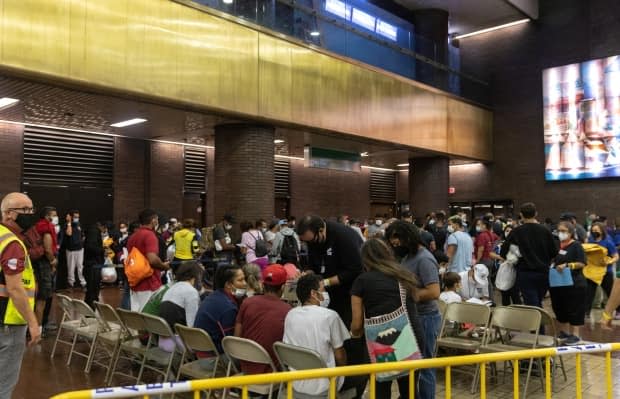For asylum seekers looking for answers, New York City's bus terminal is more than a transit hub
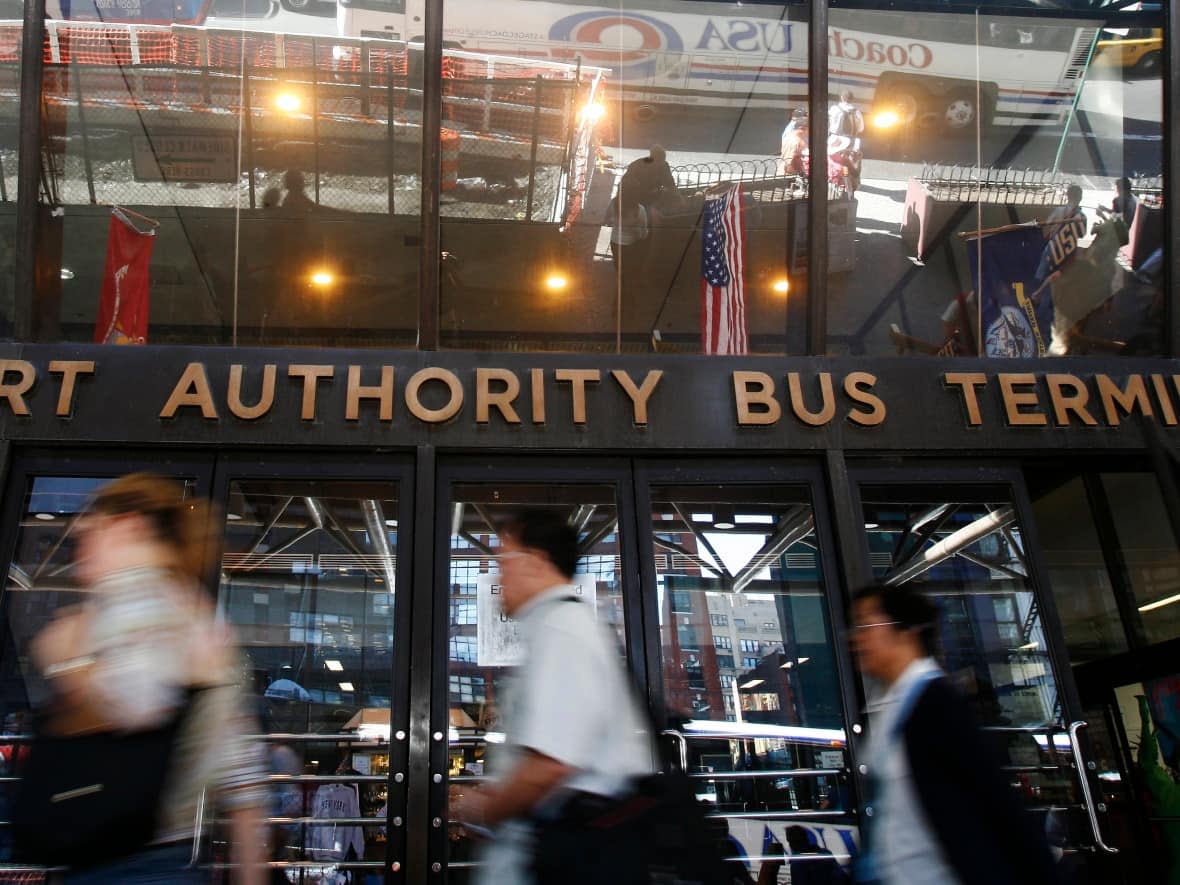
Geovanna Tonato has been looking for work in New York City for more than a month, but with her asylum claim in its infancy, a five-year-old son to look after and tens of thousands of people in the same position, it's been more challenging than she anticipated since she left her home in Quito, Ecuador, last September.
"My mother is sick, my father, too. So I told myself, 'It'll be better if I leave, go find work and I'll help you.' But I'm worse off than before," she said recently through tears after wandering through New York's Port Authority Bus Terminal, in midtown Manhattan, for a few hours.
In Quito, Tonato worked collecting bus fares from passengers, which provided barely enough money to cover her rent. Now she's not working at all as she waits for a work permit to be issued — something that can take years.
"I feel impotent because I can't do anything here," she said.
Tonato, who didn't want to be photographed, is one of many asylum seekers who make their way in and out of the bus terminal every day, looking for assistance from the National Guard with such things as shelter and food.
Officers have been posted there ever since New York Mayor Eric Adams declared a state of emergency in October 2022. The crisis began after Texas Gov. Greg Abbott decided to bus asylum seekers to New York last August after they crossed the southern U.S. border.
Over the last year, New York City has taken in 50,000 asylum seekers, 60 per cent of whom are housed in the city's shelter network. The rest live with friends and family, or on their own.
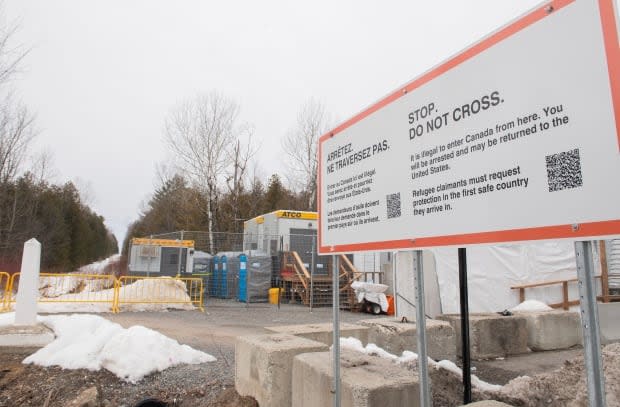
Rumours can fuel desire to cross border
Power Malu is the executive director of Artists-Athletes-Activists, one of two grassroots organizations helping asylum seekers inside the bus terminal. He said their movements across borders and state lines are often informed by rumours and success stories told by others.
"Unfortunately, some people are not going to have the same experience as others have advertised," he said. "These are communities that share information through WhatsApp, and it spreads really quickly [that] you can't even get to everyone in time to kind of give them the other side of the story."
LISTEN | The journey from NYC to Roxham Road:
Until recently, some migrants came to the terminal to catch a bus to Plattsburgh, N.Y., courtesy of the city's reticketing program, to try their luck in Canada by crossing the border illegally at Roxham Road and claiming asylum on the other side.
Recent changes made to the Safe Third Country Agreement by the Canadian and U.S. governments have since eliminated the possibility for most migrants to claim asylum that way.
According to Malu, a principal motivator was the rumour that work permits were issued at a faster rate in Canada than in the United States. But in reality, Immigration, Refugees and Citizenship Canada has been dealing with its own backlog issues and work permit delays.
"There'll still be people travelling to other places if they hear of work, because that's kind of like the most important thing that they've come here for, is to try to not rely on the system [and] handouts," Malu said.
He said the closing of the irregular border crossing at Roxham Road, south of Montreal, has brought to light some stories told by people who migrated to Canada — only to discover it was more isolating or challenging than they initially thought because of such things as the weather or language barriers.
"There are all these things that have not been discussed and have not been amplified," Malu said.
New York releases blueprint to handle crisis
Over the last year, more than 44,000 people entered Quebec from the U.S. through irregular border crossings, many at Roxham Road. In that same period, almost twice that number made the trip in the opposite direction into New York state, although the majority were returned to Canada by U.S. Customs and Border Protection.
Based on conversations he had, Malu said some of those people were returning to the U.S. after failing to settle in Canada.
Tonato had actually considered migrating to Canada at one point, but now she said she's heard of work in Spring Valley, about an hour's drive north of New York City. She was ultimately deterred because it would be too complicated for her teenage daughters, aged 11 and 16, who are still in Ecuador, to meet her there.
"I've heard that [in New York City] there's work, but I'll have to wait until the summer, that here in the summer it's really good," she said. "But if I could have a job now and someone to help me out with my son, I'm going. Because it's not the will to work that I lack."
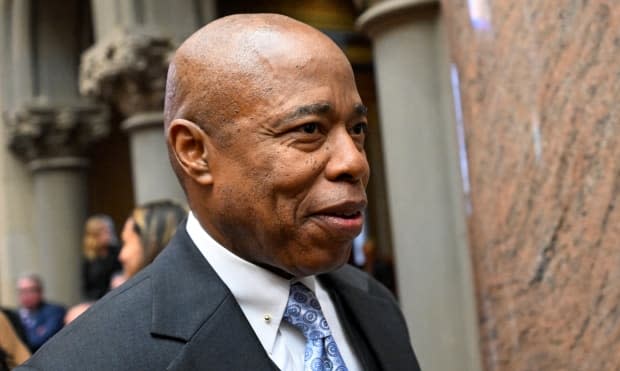
Last month, the mayor's office published a comprehensive report, called The Road Forward, laying out a blueprint for New York City's handling of the asylum-seeker crisis, including launching a pilot program focused on training asylum seekers as they wait for work permits.
The city will also create a 24/7 arrival centre to replace current operations inside the Port Authority Bus Terminal, as well as a dedicated Office of Asylum Seeker Operations.
Competition for cash jobs in New York City is fierce, said Gabriel Echevarria, another asylum seeker from Quito who migrated to the U.S. with his six-year-old son.
WATCH | New York City pays for bus tickets to transport migrants upstate:
Echevarria wakes up every day at about 5 a.m. in search of work. He used to work in construction back home and has managed to transfer his skills to New York, but he found out the hard way just how vulnerable asylum seekers can be when they're desperate for jobs.
"[Employers] make you happy and pay for the day. Then they pay you at the end of two days. Then they tell you, 'You know what, we'll pay you at the end of the week,'" he said, adding that later on, some employers simply stopped getting back to him. "The money's lost, it's very difficult that kind of situation here."
Between hope and regret
Back at the bus terminal, a man who's been out since the early morning looking for cash jobs takes a break from the cold. He left Quito, Ecuador's capital, when a local gang shot up his grocery store after he refused to pay them 25 per cent of his sales.
A few metres away, a teenage couple, also from Ecuador, sit with their baby. The boy's pinky finger has been cut clean from his hand. It's what happened when he refused to join the local gang, or pandilla, aspiring to have a music career instead.
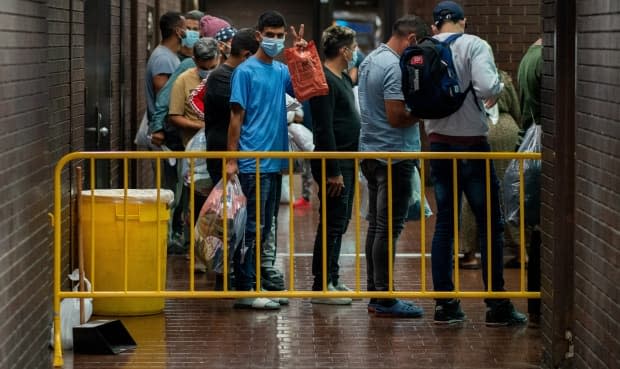
Desperation and fear from what happened in the past motivate asylum seekers more than the promise of what lies ahead. Oftentimes, they have no arrival plan beyond filing an asylum claim — something that in itself can take up to a year.
"It's more important to make sure that you're going to be supported where you go, as opposed to just taking that leap," Malu said. "Because a lot of times these dreams or these things that are being sold to them are not true."
The first time Tonato regretted her decision to leave Ecuador, she was hiking through the Panamanian jungle. She thought it would be a one-day trek, but she ended up spending more than three days lugging her suitcase while carrying her son's clothes above her head, to protect them from the mud and the rivers they crossed.
"I would tell myself, 'If here it's so hard, how will it be over there [in the U.S.]? No, over there I'll have everything, I'll work,'" Tonato recalled. "Why didn't I turn back?"
Standing in the bus terminal, she continues to oscillate between hope and regret.
"My daughter tells me, 'Mami, you've made bad decisions because here [in Ecuador], at least we're all together. Even though sometimes we didn't eat, we were all together,'" Tonato said, as tears flowed down her cheeks.
